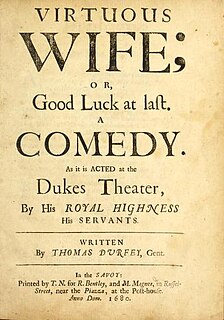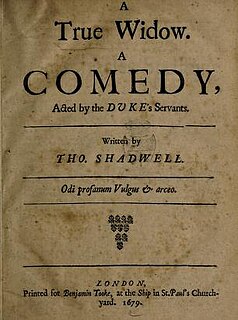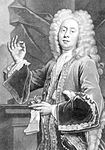The Royalist is a 1682 comedy play by the English writer Thomas D'Urfey. It was staged at the Dorset Garden Theatre by the Duke's Company, shortly before the merger that created the United Company. It is set during the Commonwealth Era following the English Civil War.
The Sullen Lovers; Or, The Impertinents is a 1668 comedy play by the English writer Thomas Shadwell, inspired by Molière's Les Fâcheux. It was staged by the Duke's Company at the Lincoln's Inn Fields Theatre in London. The cast included Henry Harris as Sir Positive At-All, James Nokes as Poet Ninny, William Smith as Standford and Edward Angel as Woodcock and Anne Shadwell as Emelia.

Epsom Wells is a 1672 restoration comedy by the English writer Thomas Shadwell. It was the first in a line of plays set in spa towns. The incidental music was composed by Nicholas Staggins. In the 1690s Henry Purcell scored a new staging of the play. It was performed at the Dorset Garden Theatre by the Duke's Company. The cast included Henry Harris as Rains, Thomas Betterton as Bevil, William Smith as Woodly, Cave Underhill as Justice Clodpate, Anne Gibbs as Lucia, Mary Betterton as Mrs Jilt, James Nokes as Bisket and Edward Angel as Fribble.
The Slighted Maid is a 1663 comedy play by the English writer Robert Stapylton.
Squire Oldsapp is a 1678 comedy play by the English writer Thomas D'Urfey. Staged by the Duke's Company at the Dorset Garden Theatre in London, the original cast included Thomas Betterton as Welfore, William Smith as Henry, John Crosby as Lovell, James Nokes as Squire Oldsapp, Anthony Leigh as Sir Frederick Banter, Samuel Sandford as Colonel Buff, Cave Underhill as Pimpo, Emily Price as Christina and Elizabeth Currer as Madame Tricklove.
The Country Wit is a 1676 comedy play by the English writer John Crowne, part of the tradition of Restoration Comedy. It was first staged at the Dorset Garden Theatre in London by the Duke's Company. The cast included Samuel Sandford as Sir Thomas Rash, Thomas Betterton as Ramble, James Nokes as Sir Mannerly Shallow, Henry Harris as Merry, Cave Underhill as Booby, Matthew Medbourne as Lord Drybone, Anthony Leigh as Rash, Mary Betterton as Lady Faddle, Mary Lee as Christina, Elizabeth Currer as Betty Frisque and Elinor Leigh as Isabella.
The Princess of Cleve is a 1680 tragedy by the English writer Nathaniel Lee, inspired by the recent French novel La Princesse de Clèves by Madame de La Fayette set during the sixteenth century. It premiered at the Dorset Garden Theatre in London, staged by the Duke's Company. The original cast included Joseph Williams as Prince of Cleve, Thomas Betterton as Duke Nemours, Anthony Leigh as St. Andre, Thomas Gillow as Vidam of Chartres, James Nokes as Poltrot, Elizabeth Barry as Princess of Cleve, Mary Slingsby as Marguerite, Elinor Leigh as Tournon and Mary Betterton as Elianor. Incidental music was composed by Thomas Farmer. The play was not published until 1689.
John Richards was an English stage actor of the seventeenth century. An early member of the Duke's Company in London, he was lured away to the new Smock Alley Theatre in Dublin by John Ogilby. He was back with the Duke's at the Dorset Garden Theatre from the mid-1670s, but while in Ireland he was able to play major roles his English performances were generally supporting parts.
Thomas Percival or Percivall was an English stage actor of the seventeenth century. He was a member of the Duke's Company from 1671 to 1682 and then the merged United Company until 1686. Throughout his career he was confined to playing supporting roles, never graduating to major parts. He was the father of the actress Susanna Verbruggen. In 1693, following his retirement from the stage, he was arrested for coin clipping, a capital crime, for which he was sentenced to hang at Tyburn. The intercession of his daughter with Mary II saw his sentence commuted to transportation, but before he reached Portsmouth he died of natural causes.

The Cutter of Coleman Street is a comedy play by the English writer Abraham Cowley. It premiered at the Lincoln's Inn Fields Theatre on 16 December 1661, performed by the Duke's Company. Cowley had originally written it in 1658 during the English Commonwealth era. The title refers to Coleman Street in the City of London. The Royalist Cowley inserted lines mocking the recent republican government of England, including Thomas Harrison who had been executed for regicide the previous year. Although it was released during the Restoration period, along with The Committee its debt to earlier traditions mean that it not a full Restoration comedy in the style that would flourish after George Etherege's The Comical Revenge in 1664.

The Comical Revenge; Or, Love In A Tub is a 1664 comedy play by the English writer George Etherege. First staged by the Duke's Company, it premiered at the Lincoln's Inn Fields Theatre. It is one of the earliest Restoration Comedies.
The Cheats of Scapin is a 1676 comedy play by the English writer Thomas Otway. It was an adaptation of the French play Scapin the Schemer by Molière. It premiered at the Dorset Garden Theatre performed by the Duke's Company as an afterpiece to Otway's new tragedy Titus and Berenice.

The Virtuous Wife; Or, Good Luck At Last is a 1679 comedy play by the English writer Thomas D'Urfey. It was originally performed by the Duke's Company at the Dorset Garden Theatre in London.
The Woman Captain; Or, The Usurer Turned Soldier is a 1679 comedy by the English writer Thomas Shadwell. It was originally staged by the Duke's Company at Dorset Garden Theatre in London. The original cast is unknown except for Elizabeth Barry who played the title role, and also read the epilogue. It is part of the tradition of Restoration Comedy that flourished during the era.

A True Widow is a 1678 comedy play by the English writer Thomas Shadwell. It was first staged by the Duke's Company at the Dorset Garden Theatre in London. The names of the original cast are unknown. The prologue was written by Shadwell's colleague John Dryden. It was published the following year and dedicated to Charles Sedley.
Mr Turbulent; Or, The Melanchollicks is a 1682 comedy play by an anonymous author. It was originally staged by the Duke's Company at the Dorset Garden Theatre in London.

Madam Fickle; Or, The Witty False One is a 1676 comedy play by the English writer Thomas D'Urfey. It was first staged at the Dorset Garden Theatre by the Duke's Company.

Tunbridge Wells; Or, A Day's Courtship is a 1678 comedy play generally attributed to the English writer Thomas Rawlins. It was originally staged at the Dorset Garden Theatre in London by the Duke's Company. The names of the original actors are not known. It did not enjoy the same success as Rawlins' earlier work Tom Essence.

Sir Salomon; Or, The Cautious Coxcomb is a 1670 comedy play by the English writer John Caryll. It has often been staged under the title Sir Solomon Single. It was first performed by the Duke's Company at the Lincoln's Inn Fields Theatre in London. It is part of the tradition of Restoration comedy.
Bussy D'Ambois; Or, The Husbands Revenge is a 1691 tragedy by the English writer Thomas D'Urfey. It was first staged by the United Company at the Theatre Royal, Drury Lane in London. It is inspired by the earlier play of the same title by George Chapman, based on the real Louis de Bussy d'Amboise.









